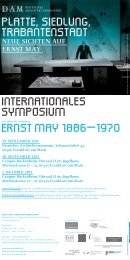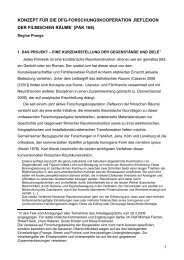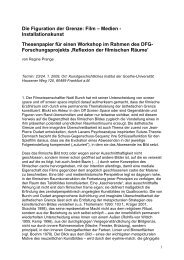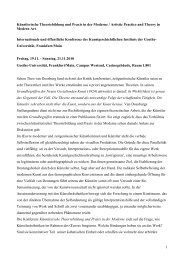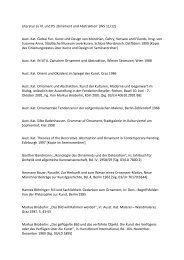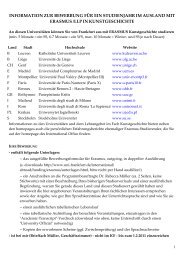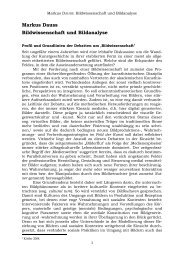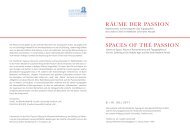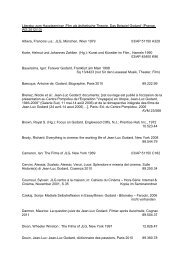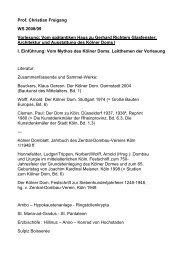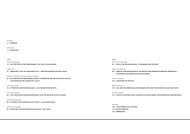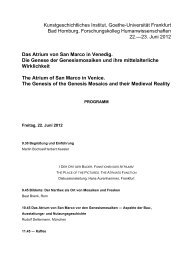PAINTING« - Museum für Moderne Kunst
PAINTING« - Museum für Moderne Kunst
PAINTING« - Museum für Moderne Kunst
You also want an ePaper? Increase the reach of your titles
YUMPU automatically turns print PDFs into web optimized ePapers that Google loves.
HIDDEN FORCES? – »<strong>PAINTING«</strong> in the 1960s and 1970s<br />
Organization:<br />
Eva Ehninger (Bern University, CH)<br />
Henning Engelke (Goethe-University, Frankfurt am Main, GER)<br />
Antje Krause-Wahl (Goethe-University, Frankfurt am Main, GER)<br />
Kindly supported by<br />
Benvenuto cellini-Gesellschaft e.v.<br />
Frankfurt am main<br />
The topic of our conference is based on the observation<br />
that the role and development of painting during<br />
the 1960s and 1970s - within both artistic practice and<br />
theoretical discourse – have been all but neglected up<br />
to now. During this time span, after more than a decade<br />
of theoretical dominance of Clement Greenberg’s<br />
formalist bias toward the medium of painting, artists<br />
and critics were ready to dismiss color and canvas in<br />
favor of a host of other media such as performance,<br />
video, happening, film, or installation. These new art<br />
forms seemed to reject not only the practice of painting<br />
but also the traditional aesthetic, institutional, and<br />
ideological values it apparently stood for. The tale of a<br />
break with painting in the early 1960s was subsequently<br />
strengthened by art critics in their negative evaluation<br />
of the new painting of the 1980s: According to them,<br />
the medium resurfaced only because of its high market<br />
value, thus solidifying its status as a truly anti-vanguard<br />
art form.<br />
We plan to examine how painting was actually still present<br />
and practised during the 1960s and 1970s – as a parallel<br />
activity within an artist’s œuvre for example, or by<br />
being reintegrated into a medium other than itself. Do<br />
the new art forms grapple with issues similar to those<br />
that have already been developed within a modernist<br />
critique of painting? Is the seemingly violent movement<br />
away from painting a relocation of these problems into<br />
other media? Or is in fact the concept of painting itself<br />
fundamentally transformed?<br />
Also, we aim to examine the subsequent art historical<br />
and critical discourse of the 1980s and 1990s that was<br />
responsible for canonizing the invisibility of painting’s<br />
influence in the decades before. What were the reasons<br />
for the dismissal of painting? Who were the protagonists<br />
of these rhetorics ? What were the repercussions<br />
for art history? How are they felt today in curricula, collections,<br />
and archives? With its renowned collection the<br />
MMK <strong>Museum</strong> <strong>für</strong> <strong>Moderne</strong> <strong>Kunst</strong> Frankfurt am Main<br />
is a fitting host for this conference, which will bring<br />
together international scholars, critics, curators and collectors<br />
to discuss »painting« as a hidden force at play<br />
within the 1960s and 1970s.<br />
»<strong>PAINTING«</strong><br />
international<br />
conference<br />
June 14–15, 2013<br />
at mmK museum <strong>für</strong><br />
moderne <strong>Kunst</strong><br />
domstrasse 10<br />
60311 Frankfurt am main,<br />
Germany
Friday, June 14, 2013<br />
Saturday, June 15, 2013<br />
10.15 am<br />
Antje Krause-Wahl<br />
(Goethe-University, Frankfurt am Main, GER)<br />
Introduction<br />
Theoretical Investigations<br />
10.40–11.15 am<br />
Tobias Vogt (FU Berlin, GER)<br />
Painting as Minor Art<br />
11.15–11.50 am<br />
Stephen Moonie (Newcastle University, UK)<br />
October and the Ends of Painting<br />
12.15–12.50 pm<br />
Victoria H. F. Scott (EPCAF, Newfoundland, CA)<br />
Does Painting Contradict itself? Does It Contain<br />
Multitudes?<br />
12.50–1.25 pm<br />
Dominic Rahtz (UCA Canterbury, UK)<br />
Dematerialization and /Cloud/<br />
Criticial Reinvestigations<br />
2.30–3.05 pm<br />
Kerstin Stakemeier (ADBK München, GER)<br />
Painting Fe-male: actualizations against genuis<br />
3.05–3.40 pm<br />
David Hodge (University of Essex, UK)<br />
Robert Morris´ Communicative Anxieties: an<br />
Immanent Critique of Painting in the 1960s<br />
4.05–4.40 pm<br />
Anaël Lejeune (University of Louvain, BE)<br />
»as if« it were a painting: Mel Bochner and the<br />
issue of painting in the 1960s and early 1970s<br />
4.40–5.15 pm<br />
Iris Wien (Courtauld Institute, London, UK)<br />
John Baldessari`s »Proposal Information Show,<br />
Cadaver Piece«, 1970, and the Dispositiv of Painting<br />
6.30–8.00 pm<br />
Curatorial Panel: New Perspectives on the Art of<br />
the 1960s and 1970s<br />
Achim Hochdörfer, curator, MUMOK, Stiftung Ludwig,<br />
Vienna; Mario Kramer, Head of Collection,<br />
MMK <strong>Museum</strong> <strong>für</strong> <strong>Moderne</strong> <strong>Kunst</strong>, Frankfurt am Main;<br />
Christiane Meyer-Stoll, curator, <strong>Kunst</strong>museum Liechtenstein,<br />
Vaduz; David Reed, artist, New York<br />
Painting and Minimalism<br />
10.00–10.35 am<br />
Hélène Trespeuch<br />
(Universite Paul Valery, Montpellier, FRA)<br />
Is there Such a Thing as Minimalist Painting?<br />
A Historiographical Study<br />
10.35–11.10 am<br />
Matthew L. Levy (NYU, New York, USA)<br />
Painting in the Age of Specificity: David Novros,<br />
Donald Judd, and 101 Spring Street<br />
11.10–11.45 am<br />
Alexander Bacon (Princeton University, New Jersey, USA)<br />
Robert Irwin’s Theory of Painting<br />
12.10–12.45 pm<br />
Elisa Schaar (The Ruskin School, Oxford, UK)<br />
Fred Sandback’s Logic of the Dislocated<br />
Dispositiv<br />
12.45–1.20 pm<br />
Rebecca Dubay (Kansas City Art Institute, Missouri, USA)<br />
Painting as Becoming:<br />
Anne Truitt’s Three-Dimensional Work, 1961-1977<br />
Film and Painting<br />
2.30–3.05 pm<br />
Malcolm Turvey (Sarah Lawrence College, New York, USA)<br />
Painting and Avant-Garde Film in the 1960s<br />
3.05–3.40 pm<br />
Eva Ehninger (Bern University, CH)<br />
Moving Landscape. Walter De Maria’s Spatial<br />
Renegotiation of the Pictorial<br />
4.05–4.40 pm<br />
Henning Engelke<br />
(Goethe-University, Frankfurt am Main, GER)<br />
Painting as Metaphor: Inventing/Deconstructing<br />
Film Avant-gardes in the 1970s<br />
4.40–5.15 pm<br />
Ken Eisenstein (University of Chicago, Illinois, USA)<br />
Paint Pain Ain’t: Hollis Frampton’s Dubitation<br />
5.15 pm<br />
Final Discussion<br />
Registration by June 7, 2013:<br />
talitha.breidenstein@stud.uni-frankfurt.de<br />
Further Information: www.mmk-frankfurt.de



